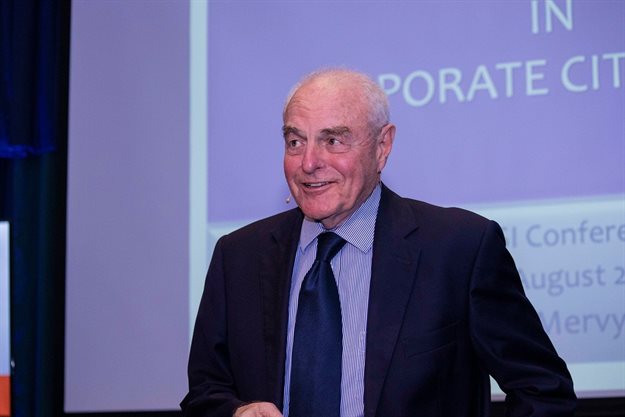'Value creation, not profit, is human nature' - Professor Mervyn King

King said corporate social responsibility (CSR) and corporate social investment (CSI) in silos are outdated practices and not applicable in the changed world we live in today. He suggested that companies that reported their CSR and CSI efforts in silos were “divorced from reality”. He added that it was inconceivable to think that companies would focus on single stakeholders only when there are a myriad of inputs affecting company outcomes.
Integrated thinking
King explained that integrated thinking extended strategy and daily management beyond the purely financial, and encompassed social and environmental factors that deeply affect a company’s viability.
“Companies now work to eradicate or ameliorate the negative impacts their industries have on society and the planet. Prior to 1995 the sole purpose of corporations was to make profit for its owners. We had a century of unsustainable development because companies made a profit that was subsidised by society and the environment.
“The principal of financial capital in the past was to create wealth at the top and have it trickle down to the bottom. But the trickle became treacle and never moved down,” King lamented.
However, the mantra has since changed from how much money companies make - at any cost - to how much sustainable value they create.
Guidance
Referring to Regulation 28, he said the Financial Sector Conduct Authority had issued a guide for asset managers because they had to include environmental impact and social inclusion in their decision making.
King added that interest in good corporate governance has grown tremendously in the past decade. Corporate scandals, environmental awareness and globalisation have all played their part in raising shareholder and public awareness in how companies should be governed.
“[Thanks to social media] we live in a world where companies can no longer hide secrets in corporate closets,” he said.
Tangible differences
According to King, the companies people register today are intangible things with no heart, soul, mind or conscience, characteristics that are dependent on corporate leadership. He explained that the nature of market capitalisation of companies has had to change completely.
To illustrate his point, he said tangible assets made up 83% of the components of the S&P’s market capitalisation in 1975. But by 2017, this figure had fallen to just 14%, while intangible assets soared to 86%. This statistic made him question the viability of the external auditing industry should it only audit financial statements.
Inclusive capitalism
King explained that Henry Ford was a pioneer of inclusive capitalism, which swept the world from the 1920s.
“Inclusive capitalism is radical economic transformation. It considers - and adds value to - the economy, society and the environment. It, therefore, has a greater benefit to society than CSI,” stated King.
The four outcomes of inclusive capitalism are: ethical culture and effective leadership; sustainable value creation; adequate and effective controls and informed oversight, and trust and confidence of community and legitimacy of operations.
Limited resources
According to the professor, strategy and reporting have become outcomes-based. The United Nations 2030 Sustainable Development Goals (SDGs), which South Africa is committed to, are also outcomes-based.
“SDGs are being built into business models. Shouldn't governments be outcomes-based too?” he asked.
In conclusion, he opined that we live in a resource-constrained world. “By 2045 the planet is expected to be home to some 9.3 billion people,” said King.
“We will have to produce more, while using fewer resources. Natural assets like water are becoming ever more critical to human survival,” he said.





























